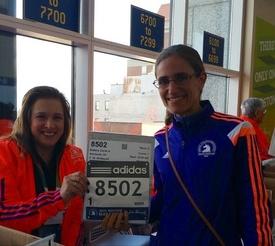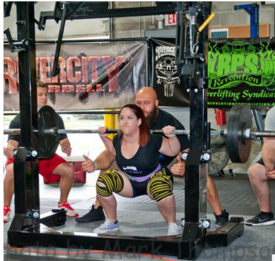walking breaks during half/half?

Robbnva
Posts: 590 Member
Anyone do these or just run the entire thing. I've been reading stuff online and someone even suggested I try a run/walk method but I'm skeptical.
0
Replies
-
Just run.0
-
I use intervals. I just finished my 5th marathon in Saturday. I ran 2, walked 1. Was on pace for a 5:10 finish, when at the 22nd mile I overheated. (sun came out, and it was 20 degrees warmer than I had trained in). You feel much stronger in long races. Search Galloway. And if you don't want to do short intervals.... Just walk for 2 minutes at each water station.
0 -
CarsonRuns wrote: »Just run.
Same as Carson.
You've done a 10mi run. It's just a 5k after.
walk at the water stations since trying to drink and run ends poorly0 -
I will usually walk up hills because my knees don't get along with hills well after 8-10 miles. I do this on long runs and I do this in races as well; I factor it into my estimated pace. I'll also walk through aid stations because it's only marginally slower than zig-zagging through the water-sipping crowd.0
-
Yup same as Carson.0
-
Just run. If I wanted some water (which I probably wouldn't) I'd also drink while running.
But if you are going to do run/walk, do it in a planned, deliberate way (like the poster above); don't just wait till you get tired.0 -
Yes, just run.
I went back to Run/ Walk in training at one stage and found I hated it. It took me time after each walk break to get comfortable running again, so I eneded up spending a disproportionate amount of time uncomfortable.
On trails I'll walk steep ascents, but that's about it.0 -
I run the entire thing. But I see plenty of people doing the run/ walk method and they are plenty quick. Some finish in under 2 hours. I agree that if this is the way you are going to do it, you should plan for it and train that way too.0
-
Run that beast down and kill it.
ETA: I have a friend that run/walks a full marathon and can get in under 4 hours. I still don't understand why he does that. He's flipping fast and could probably get close to 3:30 if he'd run the thing.0 -
just run, no break, no stop for full and half0
-
MeanderingMammal wrote: »Yes, just run.
I went back to Run/ Walk in training at one stage and found I hated it. It took me time after each walk break to get comfortable running again, so I eneded up spending a disproportionate amount of time uncomfortable.
On trails I'll walk steep ascents, but that's about it.
Same here. It hurts too much to get back into running after walking. I might vary my speed but never walk.0 -
My first half I went in with the plan to walk through each of the aid stations. I think mentally it helped me to know that I had those "breaks" coming. But all the rest, I've just run. I find it easier to just keep running that to try to start up again after walking.0
-
I use Galloway; run 5 or 6 and walk 1, depending on how I feel. he says it avoids injury. It's been true for me.0
-
I aim to run the entire thing, I may drop to a walk at the aid stations due to crowding etc, but I'd prefer to run through.
As everyone else has said, if you're going to run/walk, practice it and do it to a set plan.0 -
I started my marathoning/half marathoning run/walking (aka Galloway's method). Did my first marathon in 5:10, did my second one in 5:12 (which was in the cold rain and included an 8 minute stop at a medical tent). My third was 4:57. All six of my HM's have been done run/walking and those times have dropped from 2:13 to 2:01, but I haven't run a HM since October 2014 and that last one could have been less than two hours but I wasn't willing to "go for it" because it was my last fast run/walk of moderate distance in the taper before an upcoming marathon. Did that next marathon in 4:41...run/walk. Galloway suggests that I should be able to go considerably faster than I am going, but I like being functional in the hours after a marathon. I'm not all that far off what Galloway suggests for my time for the half-marathon using the run/walk..
I switched over to training for continual running for a marathon (on a tabletop flat marathon course). My training is not on flat terrain but the race course was. I did more miles following a Fitzgerald plan than I have ever done preparing for any race. My short-distance speed has increased significantly and I'd like to take that out for a spin in a couple of short-distance races (5K, 10K, and HM) to actually see how they work out in race conditions rather than on the trails, roads and the track.
But...when I applied continual running to my first marathon, it didn't go as well as I hoped. Granted, I went out in the first two miles about 30 seconds per mile faster than I intended but by mile 2, I was locked in to my target pace to finish at 4:30. I was on target through the halfway point, slowed somewhat by mile 20 (but still felt good and was on a 4:36 finishing pace). I picked up the pace at mile 20 and pulled away from the small group that I was running in.
However, at mile 23 the wheels began to fall off. First time I ever experience "the wall" and it was a surreal experience. I never experienced that with my previous marathons doing the run/walk. Although that group never caught up with me, the last three miles were little more than a moderately fast walk or a shuffle to the end (though I did manage to look like I was running at the finish). I was pretty much spent and I finished in 4:50.
The following weekend, I was running another marathon (first time I'd ever tried that) and in the seven days between the two races, I ran twice (three miles on Wednesday, six miles on Thursday) before running the race on Valentine's Day. The course was nearly as flat as the seven days before (fortunately) but had a huge headwind in the last nine miles. Rather than trying to run continuously like I had the week before, I went back to run/walk. Four minutes running, one minute walking and I made sure that the first two miles were slow.
I did that the entire way. When I got to mile 20, I felt slightly more tired than I had the previous Saturday and I stuck with the plan. This brought me to the last "hilly" section of the course and when I cleared that (mile 23) and was running into a constant 25 mph headwind, I decided to pick up the pace while still maintaining that 4:1 ratio. Each mile was progressively faster during those last three miles. My last walk cycle was just before the mile 26 marker, where I turned down the finishing chute and took off running to the end.
Finish time = 4:34:00.
I am running a marathon on Sunday. The plan...run/walk. My time goal is to simply beat my time from last year (4:57:02) to get the "special tee shirt." With 1250 feet of cumulative vertical according to the mapping software, I don't plan on trying to run anywhere near what Galloway predicts.
0 -
Strooper- Are you running rock n roll? I might go watch!!0
-
I run/walk. Probably always will. I'm slow, and nothing in my heart desires running 13 miles without stopping. But I can run 5 mins at a time.0
-
Both ways work. But you need to train that way to get a feel for the pace needed on the run intervals. I ran/walked one marathon in 3:48 and the next year ran in 3:32. Given an extra year of training there isn't that much difference.0
-
Seems everyone is saying "just run." I hate to be contrary to so much experience. But I believe this question was put to the test recently. I do not remember the distance, whether it was for a half or a full. But they randomized a bunch of runners, to either a run/walk plan or a run plan, just a few days before the race or at the start line. The test showed very little difference in the finish times. And the people who walked? They reported feeling much less beat-up after.
Wait! It was a marathon distance.
http://www.runnersworld.com/running-tips/study-runwalk-strategy-can-make-marathon-hurt-less .0 -
42 runner sample is way too small to be statistically significant. 7 minutes is a big deal. All runners were under trained going into the 12 week program. There is way to much wrong with this study to give it an credence.0
-
I think you might be nitpicking, Carson. If everybody was under-trained, then everyone was under-trained. They were equal. And, I think seven minutes is a lot less of a difference than you would have assumed was going to be found -- it is between a 1 percent and a 2 percent difference.
Plus, seven minutes is a big deal to someone who finishes marathons under 3:30 or faster, and runs them regularly. But to the average, 4-hour-marathon runner, it is not such a huge difference. Of course, you are not going to be able to walk part of the course and win. But, if you are over 4-hours anyway, is it worth it to add 1 percent to your time to feel much better the next day (which was also reported)?
I think the fact that they reported feeling much better afterward is not insignificant. Actually, that might be the most important suggestion the study makes.0 -
As I recall the physiological testing found no discernible difference between the two groups, so I'd question whether conditioning them to believe they would feel better has a more significant effect than the physical training.0
-
Placebo effect is still an effect.0
-
If this is the study I am thinking of, if you read the actual study, the people in the run group walked, too, at times. But it was "unplanned walking".
0 -
Also the study was concerned with whether a run walk strategy reduced cardiac stress/Load and it did not. They simply had more on the run/walk side report feeling better. However , as they obviously knew what the study was about (they were not blinded and knew run/walk was being tested), this fact is worth very little in the world of research. And it's not even bc placebo; self reporting when the subject is aware of the variable is highly unreliable - a lot of "telling the tester what you think they want to hear" happens. Or just making stuff up.
Also N=42.....
0 -
I plan on running this one, but I'll consider the run/walk for the next one.0
-
Okay. Okay. I cry 'uncle.'
But, obviously, the editors of the journal and the reviewers they used thought the study had merit, and they did not object to the observations pointed up in the Runner's World article.
Jeez. You guys are tough critics!0 -
I think run/walk is a great choice if it's what you want to do. It also gives you a chance to experience marathon completion and some have even qualified for Boston doing it.
But I also think that, if you can run/walk a marathon, you can run a marathon with proper training and preparation.
I can't judge the desires of others, but I do personally feel that there is a certain purpose to a running event. It is a challenge of running. Again, my personal thought.
And, I'm a research/science geek so studies and articles like that make me grrrrrrrrrrrr. Unless you get a whole bunch of them finding the same results with no one on the other side.0 -
At best (and in spite of other flaws) I suppose the study could show that run/walk is a good solution for people who haven't trained adequately for a marathon. But that wouldn't make it a good idea to plan not to train adequately. I am the same as Carrie and I can't see why I would want to do a race that I wouldn't be able to run all the way, though I am not knocking other people's desire to complete the distance run/walking.0
-
I run 11 minutes walk 1. Could I run the whole 13.1 without walking? Probably. Would I want to? No. I find that letting my heart rate drop and switch up the body mechanics for just a minute helps me stay relaxed. Could I have a better MM if I didn't walk? You betcha, but like others have said...there are a lot of reasons people run races and those who run/walk (I HATE that BTW, because it really should be run,run,run,run,run,run,run,run.../walk. It's not 50/50, grrrr...) probably aren't trying to win. If you are interested in the...run/walk...method, you should definitely practice it! There is a sweet spot you find as far as the intervals go. Also, if you find that you can run longer than 13.1 miles using a...run/walk...method, you should try it! I ran/walked (11/1) 26.2 miles and felt pretty good doing it. But, I think there is an idea that if you run 26.2 miles but you walk for 1 minute out of every 11 you didn't really run a marathon...you ran/walked it...so... (ooooh I'm bitter about this! I just realized!).0
This discussion has been closed.



















